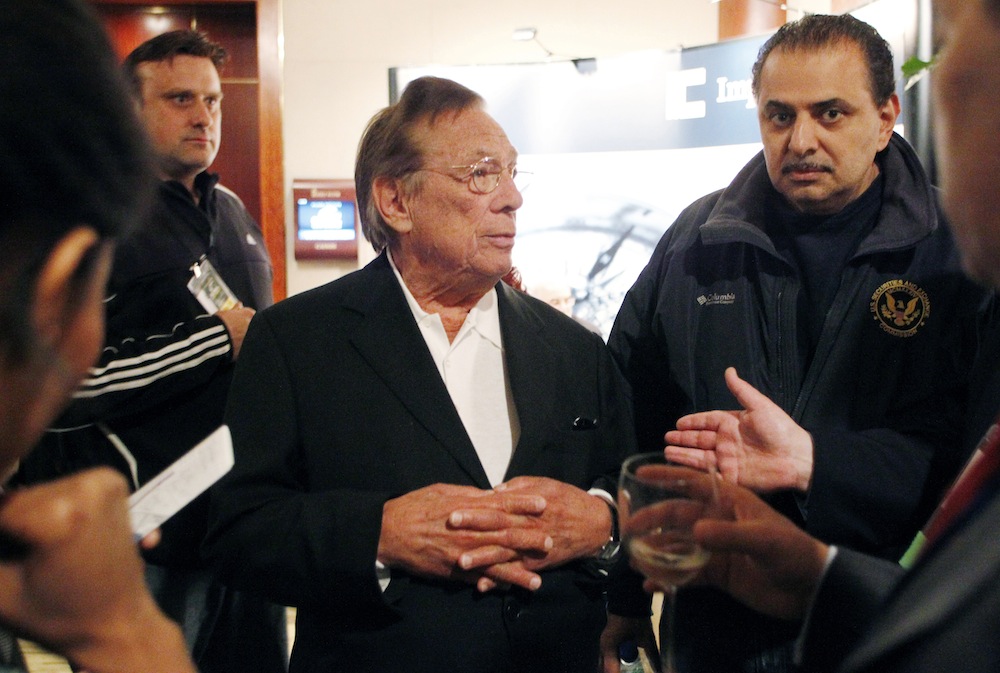
Late in Quentin Tarantino’s 1994 film Pulp Fiction, Marsellus Wallace—a criminal boss played by Ving Rhames—banishes prizefighter Butch Coolidge (Bruce Willis) from Southern California. “You lost all your L.A. privileges,” Rhames says with lethal menace, and Willis quickly leaves the Southland on his motorcycle.
If only it were that easy to kick Los Angeles Clippers owner Donald Sterling out of L.A. But, alas, Tarantino’s film is pure fantasy. There is simply no person, institution, or network in today’s Los Angeles with the clout to force powerful Angelenos to repent their sins—much less drive them out of town.
The racism heard on the leaked tape may have been news around the country, but Sterling’s discrimination against renters in his apartment buildings, and his anti-black, anti-Mexican, and misogynist views, were well-known facts of Los Angeles life for 30 years. Over those decades, no one in L.A. sought to dislodge Sterling from his role as owner of a major sports franchise. And now, with his bigotry a national news event, Sterling has become an outrageous example of the inability of L.A. to police itself, and its elite.
Even after the public release of an audio tape of Sterling demanding his girlfriend stop associating with black people, no Southern Californian was able to pull a Marsellus Wallace and kick him out of L.A. The consequences he has faced so far—and will face in the future—are all coming from the outside: from the commissioner of the National Basketball Association (who suspended him for life on Tuesday), from Sterling’s fellow team owners (who could force him to sell), and from corporations that sponsor pro basketball (and have disassociated themselves from the Clippers).
Thank goodness for those punishments, because who here would have had the juice to force him to sell the team? Prominent business leaders? L.A.’s rich corporate types are more engaged nationally and globally than locally, and they don’t have the public profile, or leverage, to threaten Sterling or his team. City political leaders? L.A.’s charter keeps mayors and city council members from having too much power. Ironically, the mayor of Sacramento, former pro basketball star Kevin Johnson, has had more of a role than L.A.’s own mayor, since Johnson was retained by the players’ union for advice on dealing with Sterling. The town’s newspapers or TV stations? They’re mostly shrinking in ambition and staff.
In L.A., accountability almost always requires outside intervention. Los Angeles County Sheriff Lee Baca had mismanaged the jail for years, but only resigned earlier this year after the federal government began investigating. When Dodgers owner Frank McCourt was sabotaging the team, it took the commissioner of baseball, in Milwaukee, to force the team’s sale. In the past generation, the Metropolitan Transportation Authority, the Los Angeles Unified School District’s special education program, and the Los Angeles Police Department all have required forms of federal receivership.
Outside intervention, of course, is no panacea. But the alternative is unchecked defiance, the best current example being Brian D’Arcy, head of the biggest union of L.A. Department of Water and Power (DWP) employees. For months, he has refused demands from city leaders, the courts, and the media that he turn over financial documents on two nonprofits that received $40 million from ratepayers. Even as he stonewalled, D’Arcy served on the Los Angeles 2020 Commission, a group of distinguished L.A. citizens, as they issued a report complaining about a lack of accountability in city government. Did I mention that defiance is a close cousin of shamelessness?
In Sterling’s case, it’s unclear whether other powerful Angelenos would have moved against him—even if they could have. For one thing, he’s got the kind of hallowed, homegrown personal narrative—poor kid from the Eastside (Boyle Heights) who becomes a Westside titan (real estate)—that buys plenty of second chances here. And Sterling bought social status by becoming a major player in the phony, philanthropic Beverly Hills hotel chicken dinners that always make rich people look charitable and sometimes raise money for a good cause.
By handing out money to many different people and organizations across all lines of geography, cause, and ethnicity, Sterling incentivized much of Los Angeles to ignore his racism. Among those who looked the other way for years was the Los Angeles chapter of the NAACP, which was about to give him a second lifetime achievement award when the recent news broke. It didn’t hurt Sterling that he advertised his charitable exploits in the L.A. Times, a paper that has portrayed him more as creepy uncle than as unrepentant racist.
This particular moment has exposed the underbelly of Southern California’s open culture. Weak institutions and weak leadership free people here to do as they please and be who they are. But when someone powerful does real damage to Los Angeles and its reputation, there’s no one able and willing to protect us.
Sterling’s conversation with his girlfriend—who, as a 30-year-old multiracial gold digger, was the perfect companion for the wealthy 80-year-old Los Angeles racist—was offensive and nonsensical. But Sterling did say one thing that hit close to home. When his girlfriend asked why he wouldn’t stand against racism in the world, Sterling said on the tape: “We don’t evaluate what’s right and wrong. We live in a society. We live in a culture. We have to live within that culture.”
For all the criticism of Sterling that you hear from Angelenos now, he is decidedly the product of Los Angeles culture. He thrived here. Now, he defines us.





Send A Letter To the Editors